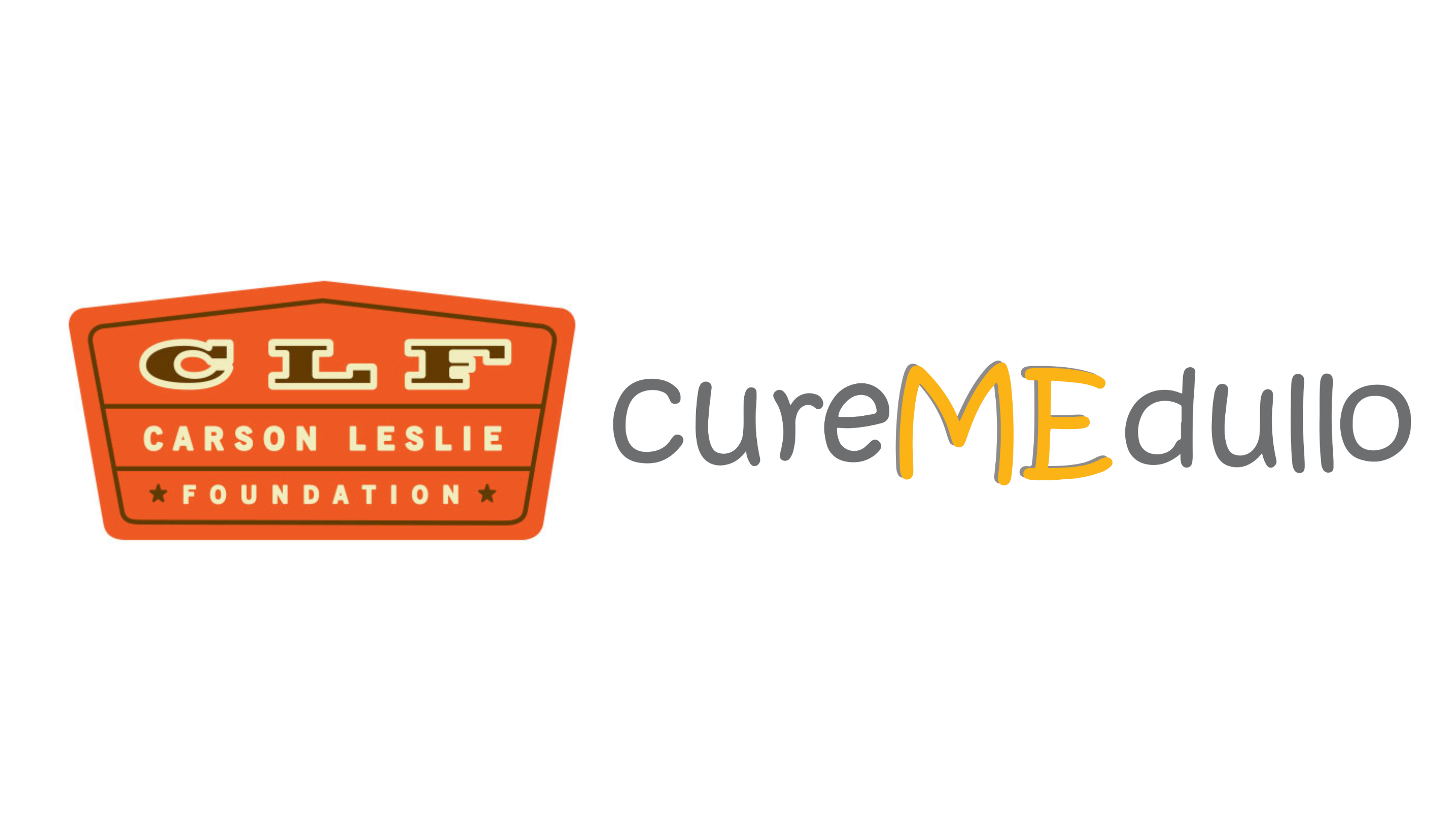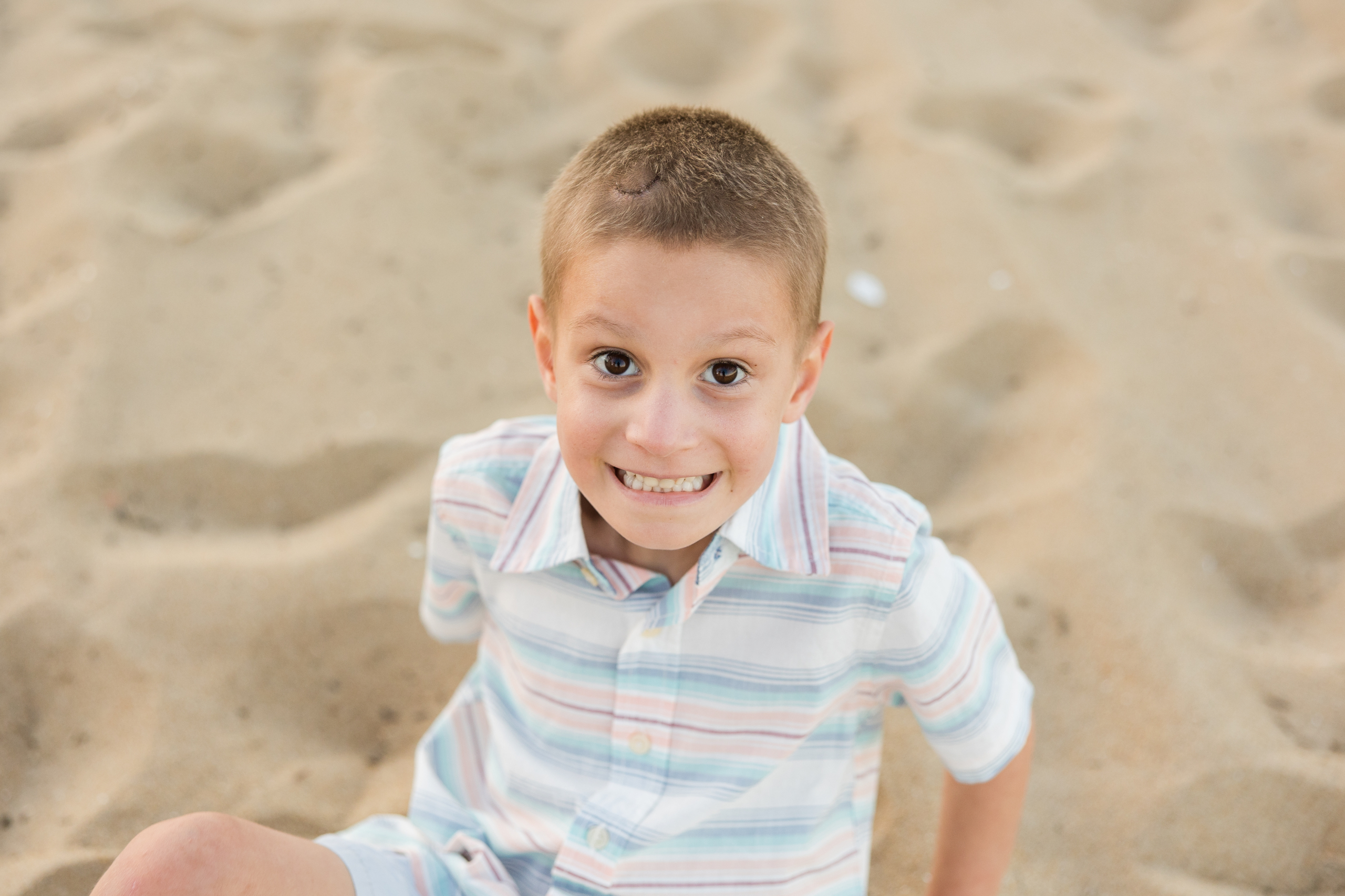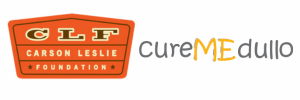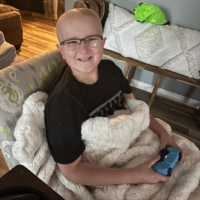I was driving Paxton’s sister home from her art therapy appointment when she said, “You know Mom, Paxton is a legend.” “What do you mean he is a legend?” I asked her. “Well, he was a hero.” He most certainly was my hero. Paxton had courage and strength that transcended ordinary people. He had a humorous and caring personality that endeared him to so many people. Through all the trials he endured he kept smiling; he kept making people laugh. He brought joy to other people.
Paxton fought bravely for two years. During those two years, I was often worried that Paxton’s personality, which I loved so much, would be lost as a side effect of surgery, or chemo, or radiation, or even the difficult journey. I feel lucky that his personality never changed. Paxton celebrated his fourth birthday eight days after a craniotomy surgery that removed the medulloblastoma tumor from his cerebellum. He couldn’t walk without help at that point and he was still in pain, but he gave his family a huge smile for his birthday photo.
Paxton eventually got stronger and was able to walk again. His brain surgeon was amazing, the damage to his cerebellum was minimal and minor compared to some of the other side effects that could have happened. The loss of some coordination and strength didn’t slow him down and didn’t upset him until a couple years later when he started realizing he was slower than his friends on the school playground.
Paxton spent the summer of his fourth year of life in and out of the hospital for chemotherapy treatment and fever protocol. The doctors decided to treat him with what they called the “baby brain” protocol; intense chemotherapy first, then radiation second. They did this to delay radiation, hoping to help minimize the side effects of radiation on a young brain. The nurses and staff at the hospital were fantastic, even though we spent days upon days in the hospital, Paxton was happy. As much as a kid can be when they are often vomiting or being woken up for midnight showers to wash away Thiotepa (a chemo that is partly excreted onto the skin surface).
Paxton’s favorite thing to do at the hospital was ride his Apple Machine (a green Ezyroller). When his port “tubey” wasn’t hooked up to fluids he would zip around the hallways without me. Sometimes he would wear a Fire Chief coat and blow his fire horn while proudly showing off the badge the hospital staff had made him. The badge looked like the one all the staff wore, but Paxton’s said his job was “Fire Truck Driver.” On the days Paxton was hooked up to his IV pole he had to move slower, because I would be running after him trying to keep up while pushing the pole down the hallways.
Nighttime in the hospital was always the hardest for me. That was the time when I would lie next to Paxton as he fell asleep, and I would allow myself to cry. During the day, it was always easier to focus on the present and not look too far into the future but while snuggling against his warm body in the quiet, darkness of the hospital room, my mind would start to ask questions about the future. One of the questions that often came was “Would Paxton ever get to go to kindergarten?” Going to Kindergarten was an experience that I wanted him to have. It is a quintessential part of what I imagined his childhood would include.
The months between September, when he finished the intense chemo, and August, when I snapped that first day of kindergarten picture, were challenging but also mixed with fun and laughter. Paxton spent six weeks receiving daily sedation to keep him perfectly still during radiation treatments. I expected the six weeks of daily anesthesia to be miserable, but he loved his “sleepy medicine.” He loved the child life specialist and the sedation team that took care of him everyday. He made them laugh with all the jokes he shared and the silly things he did, and they would share jokes with him too.
“Why does a duck have tail feathers?” Paxton asked. “To cover its butt-quack!!”
He celebrated his fifth birthday during radiation treatment. The radiation team threw him a shark themed birthday. They decorated his room with balloons and gave him shark sheets and a joke book. He had so much fun that he was actually sad when radiation treatment ended. He was sad because he didn’t get to see the people he called his friends anymore, and he didn’t get his morning naps. Yes, a five-year-old boy made lots of friends with adults. His laughter, his smile, his hugs, and his kindness brought them joy and happiness.
In the summer before kindergarten, the medulloblastoma cells started growing into tumors again. He had relapsed. Despite months and months of chemotherapy and through weeks of high dose radiation the medulloblastoma cells survived. We opted to have Paxton undergo yet another surgery to have an Ommaya reservoir placed so he could receive chemotherapy directly into his CSF. We were scared about another surgery, and we wondered what other kids would say about the Ommaya when he started kindergarten. Luckily, we had the same neurosurgeon that had performed his craniotomy and Paxton was fine. The Ommaya and the surgery site were smaller than we thought they would be, and Paxton never said anything to indicate he was being made fun of. The only time he complained about the Ommaya was when the kids were learning how to do front rolls in gym class. Paxton couldn’t do them because it hurt to put pressure on his Ommaya.
On one of the first days of kindergarten, his teacher had all his classmates answer this question: In kindergarten, I want to learn to_______. Paxton’s answer was “help other friends.” Paxton didn’t live long enough to graduate with his classmates from kindergarten, but his teachers say that he was very good at sharing his love with friends and teachers. He was “always coming up with very nice things to say, and for that he was so loved by his peers.” A note from another teacher said, “Paxton, thank you for always spreading your cheerful spirit. You brought laughter, love, and sunshine into our lives.”
Even in the last couple weeks of his life his beautiful personality, his humor, and his kindness still shone. During the months he was receiving chemotherapy through his Ommaya, there were medulloblastoma cells building tumors in his hip and in his jaw. The size and pain from his hip tumor made it hard for him to walk. I had to carry Paxton from place to place. The pain didn’t stop him from showing how much he liked “help(ing) other friends.” When his cousin came inside the house bleeding on her knee, he insisted that he be picked up and carried into the kitchen where the bandages are kept. He sat on the kitchen floor administering Neosporin and placing a bandage over the boo-boo.
We donated to cureMEdullo in memory of Paxton. By donating to research to find a cure for medulloblastoma we hope that the money will do what Paxton wanted to do, “help other friends.”
Paxton’s sister, Hannah, said another profound thing one night not long after her brother died. In the darkness of her room, we talked about life and death. We talked about how much we miss Paxton. At one point Hannah said, “Paxton didn’t live a long life, but he lived a good life.”




